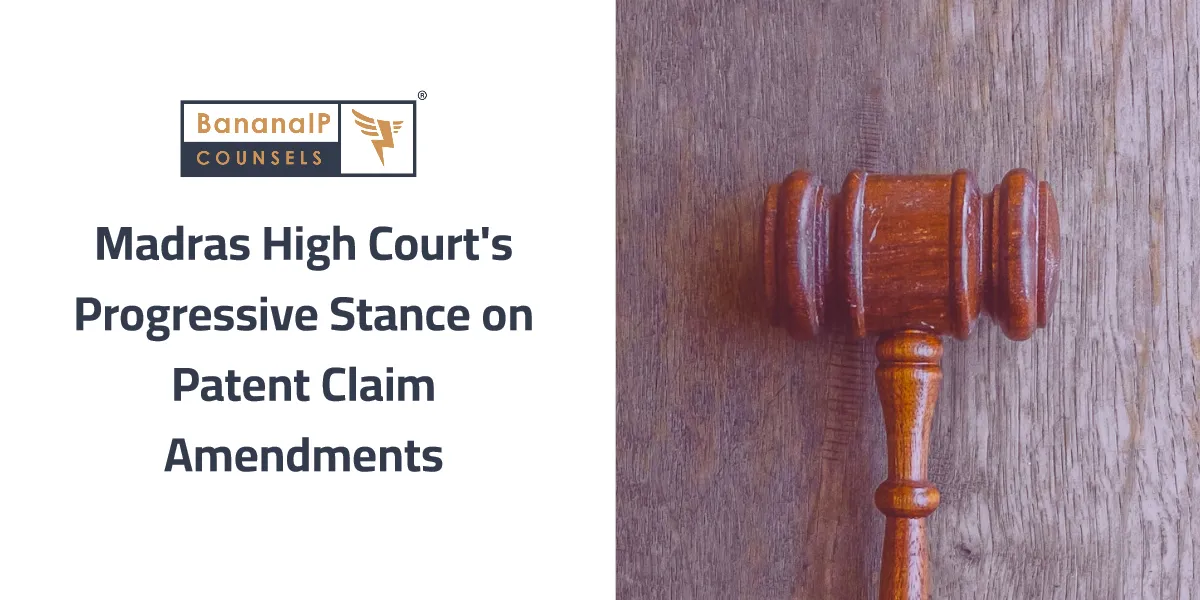In this post, we at BananaIP bring to you select Patent cases relating to Patent Claim amendments, Patent exclusions, and Patent orders.
Amending polypeptide patent claims mentioning specific sequence IDs to polynucleotide claims mentioning the said sequence IDs is permitted, says Madras High Court.
While dealing with the rejection of a patent application based on impermissible claim amendments, the Madras High Court reiterated that claim amendments are permissible as long as the amendments are disclosed in the specification. After reviewing the claim amendments, the Court stated that claiming polynucleotide sequences coding for specific polypeptide sequences when the polypeptide sequences with specific sequence IDs were earlier claimed is permissible. It stated that replacing polypeptide sequence claims with polynucleotide sequence claims amounts to narrowing, and not broadening amendments. The Court set aside the rejection order of the Controller of Patents based on Section 59 and remanded the application to another officer for fresh consideration.
Citation: Commonwealth Scientific and Industrial Research Organization and Ors. Vs. The Assistant Controller of Patents and Designs [(T) CMA (PT)/14/2023 and (ORA/41/2020/PT/CH)]
Rejection of Huawei’s patent application based on format of method claims and failure to file condonation petition set aside by the Madras High Court.
The patent office rejected a patent application filed by Huawei based on the grounds that the method claims were not modified based on discussion during the hearing, and that a petition was not filed seeking condonation of delay in filing Form 3. The Madras High Court stated that the rejection was not based on merits and that the applicant could have been called upon to correct any format or typographical errors. The Court set aside the rejection order and remanded the application for consideration by another officer.
Citation: Huawei Technologies Co. Ltd. Vs. The Controller General of Patents & Designs and Ors. [(T) CMA (PT). 53 of 2023 and OA/33/2020/PT/CHN]
Unreasoned rejection of Microsoft’s patent application relating to “Software Defined Radio Architecture” set aside by the Madras High Court.
The Madras High Court recently set aside an order of the Controller of Patents rejecting a patent application of Microsoft relating to “Software Defined Radio Architecture”. The Controller refused the patent application based on three prior art references but did not give any reasoning except citing a few paras from the prior arts. This patent application was granted by the EPO after reviewing the same prior art references. As the order was unreasoned, the Court set aside the rejection order and remanded the application to the patent office for fresh consideration by another officer.
Citation: Microsoft Technology Licensing, LLC Vs. The Controller of Patents and Designs [CMA(PT).No. 21 of 2023 and CMP.No. 17945 of 2023]
Patentability Exclusions: Thermostability that enhances efficacy is sufficient to overcome Section 3(d) exclusion, and Section 3(e) is not limited to known substances, says Madras High Court.
In a case involving a patent application relating to phytase variants, the patent office rejected claims based on Sections 3(d) and Section 3(e) of the Patents Act. Setting aside the rejection under Section 3(d), the Madras High Court stated that claims 1 to 7 are patentable because the phytase variants claimed have enhanced thermostability, which enhances the efficacy of their use in animal feed. The Court also stated that the explanation to Section 3(d) is not applicable to biochemical substances as the language used therein specifically refers to only chemical substances.
Dealing with Section 3(e), the Court stated that the provision is not limited to admixtures of known substances and that the provision would be applicable even if one of the ingredients is novel and inventive. It rejected the composition claims under Section 3(e) because the applicant did not show a synergistic effect.
Citation: Novozymes Krogshoejvej Vs. Assistant Controller of Patents and Designs [(T) CMA (PT) No.33 of 2023 and OA/6/2017/PT/CHN]
In vitro diagnostic processes and processes for screening are not patentable under Section 3(i) if they are capable of identifying a disease, disorder, or condition for treatment, says the Madras High Court.
In a case involving a patent application for a genetic test for determining chromosomal imbalance, the Madras High Court stated that the method claims are not patentable because they are inherently aimed at diagnosing a condition (chromosomal aneuploidy) for treatment. The Court stated that the fact that the methods are performed in vitro is not relevant. It also stated that the fact that the method does not give rise to a final decision about the condition is also not relevant. To determine whether a diagnostic process is patentable or not, the Court stated that the question is whether the process inherently identifies a disease, disorder, or condition for treatment.
Citation: The Chinese University of Hong Kong Vs. The Assistant Controller of Patents & Designs [CMA (PT) No.1 of 2023 & C.M.P.No.13206 of 2023 and W.P.No.7666 of 2023 & W.M.P.Nos.7828 & 7832 of 2023]
These rulings emphasize the need for precise and strategic thinking in patent drafting, patentability issues, amendments and other aspects, areas where BananaIP’s expertise becomes invaluable. The case notes are aimed at providing clarity to Patent Attorneys and Professionals which may help them navigate the Indian Patent system effectively.
If you have any questions, speak with an Patent expert/attorney – contact@bananaip.com or 91-80-26860414/24/34.



